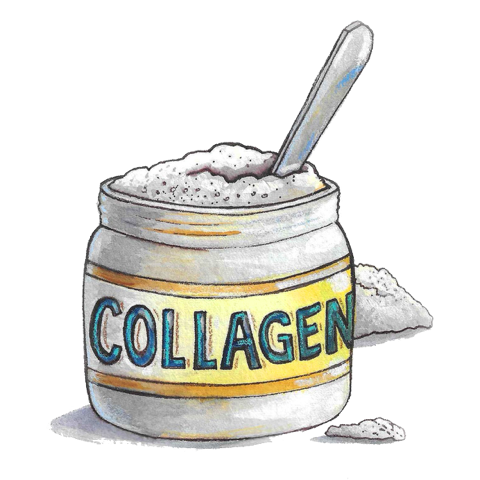
Common Names
- Collagen peptides
- Gelatin
- Hydrolyzed collagen
For Patients & Caregivers
Tell your healthcare providers about any dietary supplements you’re taking, such as herbs, vitamins, minerals, and natural or home remedies. This will help them manage your care and keep you safe.
Collagen is a protein that your body makes to support the skin and bones. It is found in foods such as bone broth, fish, skin-on chicken, beef, pork, organ meats, egg whites, and berries.
Collagen supplements come as powders, tablets, capsules and liquids. It is also added to skin creams and moisturizers.
Collagen is used to:
- Improve elasticity of skin and reduce wrinkles
- Strengthen nails and hair
- Help reduce joint pain and stiffness
- Heal wounds
Collagen also has other uses that haven’t been studied by doctors to see if they work.
It’s generally safe to get collagen from food. Talk with your healthcare providers before taking collagen supplements.
Supplements can interact with some medications and affect how they work. For more information, read the “What else do I need to know?” section below.
- Side effects have not been reported.
For Healthcare Professionals
An important structural protein, collagen mainly consists of the amino acids glycine, proline, and hydroxyproline. It helps maintain skin elasticity, volume and moisture; and plays a role in keratin production that provides structure to hair, nails and skin. Collagen is made naturally in the body, but production decreases with aging, sun damage, smoking as well as alcohol consumption. Collagen supplements, for both oral and topical use, are promoted for improving skin, nail, and hair health.
There are no conclusive data on the skin protective effects of collagen. Although meta-analyses suggest that collagen peptides help improve skin hydration and elasticity (1) (2) (3), conflicting findings from another analysis showed no such benefits (4). Supplementation may improve nail health, but larger trials are needed to confirm efficacy and safety of long-term use (5) (6).
Collagen was also shown to have positive effects on pain and function in patients with osteoarthritis, but the quality of evidence is low (7) (8). Additionally, it may support recovery in physically active individuals by aiding connective tissue repair and reducing joint pain (9) (10).
In the context of cancer, preclinical findings show that collagen plays a dual role. High collagen levels may promote metastasis in breast cancer models (11) and decrease efficacy of anti-PD-1/PD-L1 therapies in lung cancer models (12). But collagen also demonstrated tumor-suppressive effects in breast cancer cells (13) and conferred protection against pancreatic cancer (14).
Future research is needed to clarify the role of collagen in cancer and its treatments.
- Bone broth, fish, skin-on chicken, beef, pork, organ meats, egg whites, berries
- Skin health
- Nail and hair health
- Joint health
- Wound healing
Collagen contributes to the extracellular matrix in connective tissues, providing structural strength and elasticity. Hydrolyzed collagen peptides are absorbed in the gastrointestinal tract and stimulate fibroblast activity, leading to increased collagen synthesis and extracellular matrix remodeling (1) (2). They also promote the production of glycosaminoglycans, supporting skin hydration (2).
In other studies, collagen was shown to reduce inflammation and cartilage degradation through its effects on T-cell activity and macrophage polarization (15).
High-density collagen can affect the ability of T cells to kill cancer cells by regulating the migration of T cells into the tumor (16). However, it also showed tumor-suppressive effects in breast cancer models via its effects on fibrillar collagen deposited and remodeled by stromal fibroblasts/ECM functional units (13).
Adverse effects have not been reported.